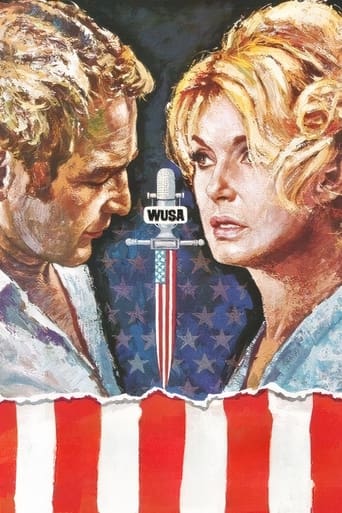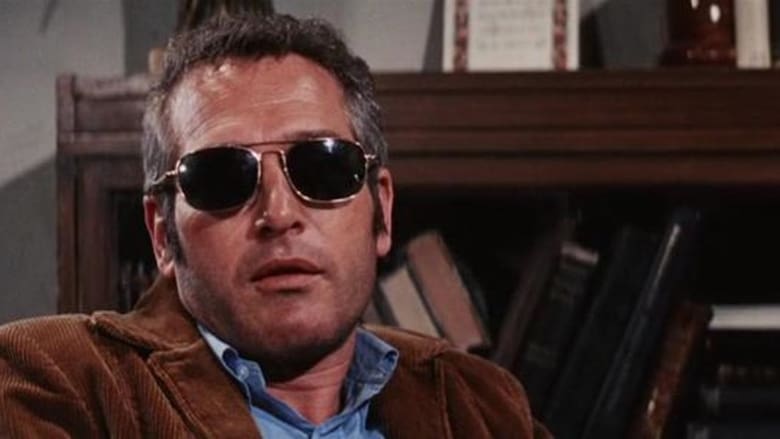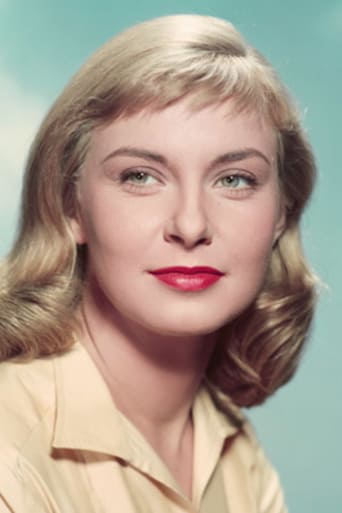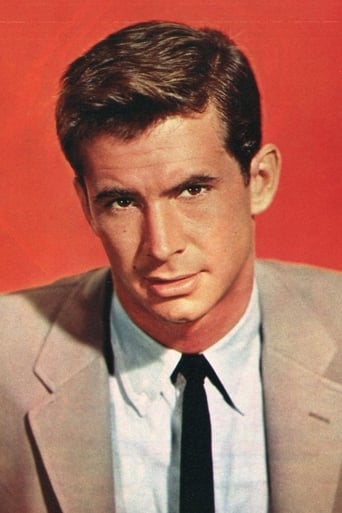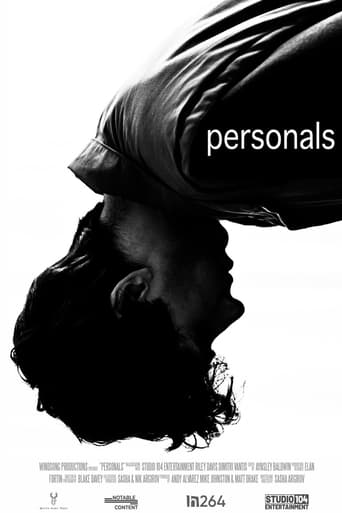WUSA (1970)
Rheinhardt, a cynical drifter, gets a job as an announcer for right-wing radio station WUSA in New Orleans. Rheinhardt is content to parrot WUSA's reactionary editorial stance on the air, even if he doesn't agree with it. Rheinhardt finds his cynical detachment challenged by a lady friend, Geraldine, and by Rainey, a neighbour and troubled idealist who becomes aware of WUSA's sinister, hidden purpose. And when events start spinning out of control, even Rheinhardt finds he must take a stand.
Watch Trailer
Cast


Similar titles
Reviews
"WUSA" is extremely difficult on us in so many ways that to reach a final conclusion on why we like it or feel it relevant is something that demands a lot from viewers. You have a jaw dropping stellar cast (Paul Newman, Joanne Woodward, Anthony Perkins, Cloris Leachman, Laurence Harvey, Pat Hingle); a director who never extracted a bad performance with his films, the great Stuart Rosenberg ("Cool Hand Luke", "Voyage of the Damned", "Brubaker"); a story working with great basic elements involving the power of media, political and inner conflicts, rich vs. poor and more. What turned this perfect merge into a near let down was its writer Robert Stone, adapting his own novel, writing his first film screenplay and the blame is on him. That was exactly the problem. Stone didn't get the mechanics and language of cinema, over complicated a scenario that could and should be a little palatable to audiences, at least to generate interest for the characters. As said, "WUSA" is a near let down; gladly, we had the cast to save it from ruins and achieve a good cult status. In it, Newman plays the cynical and drunk Rheinhardt, a drifter who accepts a job at a radio station controlled by influential politicians whose motto seems quite familiar in our current times (Make this country Great Again). The WUSA station is one with a point of view, says Hingle character and that distorted point of view destine to include only a certain parcel of New Orleans population and excludes the rest in the majority, it starts to raise some concerns on a fellow named Rainey (Perkins), an idealist survey worker trying to discover the welfare problems faced by the black communities of the place. Rheinhardt and Rainey are neighbors who frequently clash at each other (cynicism vs. idealism; reality vs. utopia) and their quarrels are meddled by Geraldine (Woodward), of whom Rheinhardt has a more intimate involvement, and one that seems to get a grip on this wild drunkard who fail to notice that his bosses are planning something bad as local politics in upcoming elections, and worst of all...his editorials during the radio program are the main force behind the power WASP's success.Such overview of the film seems attractive, specially for those who love those kind of movies about inner conflicts and different schools of thoughts. However, the screenplay jumble up with practically every possible element and device needed to further the plot along with ones that doesn't add up to much. Examples: the radio thing takes an awful lot of time to happen and when it does, it's a huge disappointment that the film never shows what kind of material Newman's character presents to his listeners except "the future of America is up to you". The film allows us to see Rheinhardt shouting about being a liberal but blocks itself when it comes to present what are the actual plans of the powerful and their conservative speech. Perkins with the survey thing occupied a good portion of the film and could have been trimmed down just as much as some of the most tender scenes between the main couple (great chemistry though). Less with the romance, more with the politics and sinister plans, then we'd have a better film than what we've got. And let's face it: the movie doesn't show anything new. If you think "WUSA" is explosive, daring and ahead of its time, then you know very little of this world. "WUSA" just show something called the system and the system is controlled by a minority with money and power on the top of the pyramid, and below there's everyone else following their orders, directly and indirectly; and to avoid giving the appearance of a fascist organization they throw something called democracy, divides itself into parties that look and think different, begs us to vote but whenever there's a shift in the power gear it's always the same corrupt and crooked thing. It never changes, only small fractions but it's always the same and it cannot be challenged because they always come back to haunt or kill your opposition (Rainey defies a businessman at a party in one of the greatest sequences). True in the 1970's and before that, and a more harmful truth now. Obviously the film isn't on the nose with such idea but it's there whenever Rheinhardt opens his mouth, specially when it comes to belittle Rainey, of whom he calls a whiner. But the film keeps it real: the cynic drowns himself under the liquor; the idealist finally does something after spending too much time on a lethargic state (but obviously a wrong act) and the mediator in between them couldn't find the strength in herself to join them, debate ideals and find possible solution to their problems and the ones from the community. But she also had a past and problems of her own, many of which she can't seem to escape. The cast gathering is fine, despite the lack of involvement we have with the characters they play (no one gets saved, they're all critical but substantially real); the ideas carry some relevance but most of it gets torn apart and lost along the way making the experience of seeing "WUSA" a weary endeavor. The good qualities out-weight the bad at the end - I respected that conclusion despite being a predictable cliché. Watch with reservations and low expectations. 6/10
A lot of what was predicted in the film Network about the media was also put forth in this film about radio WUSA. Sad to say it was laid on a bit too thick by its players and director.Paul Newman who had a lot of faith in this project plays an itinerant disc jockey who both gets a job at this New Orleans based radio station WUSA and takes up with hooker Joanne Woodward, a girl whose heart really isn't in her work anyway.As station owner Pat Hingle says, "this is a station with a point of view" and Hingle expects that point to be emphasized at all times. At that time the Richard Nixon White House was big on telling us that they were looking toward the great 'silent majority' of Americans who took the 'my country right or wrong' dictum to the exponential height. That's WUSA's point of view.Newman is not a terribly sympathetic figure here which is one of the reasons the film flattens out. He sees what's wrong, but just goes with the flow. A whole lot like the characters with one exception in that other Louisiana based political drama, All The King's Men.One who doesn't is Anthony Perkins who plays this rather pitiable 'survey taker' whose job is really to foster racial discontent by getting minorities thrown off welfare. I imagine there were many a Perkins out there, but this one doesn't like being taken for a fool and he reacts most violently. Perkins is probably the character you most remember from WUSA.WUSA correctly predicted the advent of right wing talk radio about fifteen years before it became a fact. Rush Limbaugh would have been right at home on Pat Hingle's station. They've even got a right wing political preacher played by Laurence Harvey as part of their family. Harvey's another interesting character, but he's also laid on a bit thick for my taste. He should have adapted a more subtle approach to the part.I wish I could rate such a prescient film as WUSA a bit higher, but the heavy handed approach just gets in the way.
This movie is a mess. It is badly edited and directed; scenes go on and on with little effectiveness. The whole thing is overlong, very predictable with stock characters (cynic meets heart of gold)and poor exposition. Newman and Woodward have great chemistry, however...if you have the patience.I suspect that the novel or story itself is to blame, as the survey business if poorly developed with odd tricks, like money that is never explained. Tony Perkins uses his familiar tricks and tics in his performance, but here it is over-the-top and just embarrassing. Leachman's character is well conceived and played, but the symbolism of her disability is wasted (if it exists). Her character is the best written, actually... I wish I had liked the movie more, as I usually love Newman and Woodward. But this is hopeless.
Perhaps because the drama is so overwrought, Newman's acute underplaying is effective Rheinhardt is his most thorough cynic: a failure at marriage and as a musician, he's become a wandering, alcoholic opportunist, so spineless and corrupt he thinks nothing of taking a job as announcer for WUSA At lasta Newman character who's abandoned all ideals, ambitions and principles, who concentrates exclusively on surviving at all costs He's even worse than "Hud," because he realizes his corruption but persists In fact, he uses his self-knowledge to pretend superiorityto laugh secretly at the Neo-Fascists, while working for them He acts cynically and viciously toward liberal Do-Gooders because presumably he "knows the score," although he really envies their idealism; and he rises above it all to a liquor-soaked detachment His only ability is the put-ononce the essence of Harper's charm, now exposed as the weapon of a destructive mind Rheinhardt's first appearancehe drifts into New Orleans, unshaven, tired, defeated, brokeis like Fast Eddie's after his loss to Fats Like Eddie, he picks up a despairing, fallen woman, Geraldine (Joanne Woodward), a former hooker who, like Sarah, is physically and emotionally scarred As always, Woodward flawlessly portrays the fragile, easily hurt woman who is wary of Newman, but who ends up giving him more affection than he can return They have some tender scenes, but with her, as with everyone else, he's most1y indifferent and uninvolved "WUSA" suffers from conversations that sound like speeches, heavy-handed direction, and a paradoxical reluctance really to meet the issues head-on

